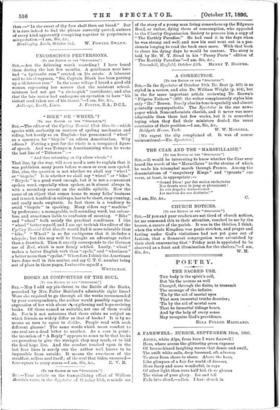" BIKE " OR " WHEEL "? [To THE EDITOR
OF THE "SPECTATOR."]
Stn,—The editor of the Cycling Tourist Club Gazttte—which speaks with authority on matters of cycling mechanics and riding, but hardly so on English—has pronounced " wheel " • as a synonym for " bicycle " an odious Americanism. Why odious ? Putting a part for the whole is a recognised figure of speech. And was Tennyson Americanising when he wrote the last line of " Tithonus :— " And thee returning on thy silver wheels" ?
That line, by the way, will soon need a note to explain that it was published many years before women or even men cycled. Bat, also, the question is not whether we shall say " wheel " or "bicycle." It is whether we shall say "wheel" or "bike." " Bicycle " is a good word enough, but it is not a convenient spoken word, especially when spoken, as it almost always is, with a secondary accent on the middle syllable. Now the name of an object that comes home to many folks' business and is much handled on railways, has to be short, easy-running, and easily made emphatic. In fact there is a tendency to avoid "bicycle" in speaking. Many riders say " machine " by preference ; a manageable, well-sounding word, but colour- less, and sometimes liable to confusion of meaning. "Bike" and "wheel" both satisfy the practical conditions. I like "wheel" better myself, and I am apt to think the editor of the Cycling Tourist Club Gazette would find it more tolerable than "bike." " Wheel " is so far ambiguous that it includes a tricycle ; but this may well be thought an advantage rather than a drawback. Then it exactly corresponds to the German use of Bad, which is now firmly settled. Lastly, " wheel " makes a better English verb than "cycle," and " wheelman" a better noun than "cyclist." Wherefore I think the Americans have done well in this matter, and my C. T. C. number being out of place in these pages, I subscribe myself a
WHEEL:HAN.






































 Previous page
Previous page